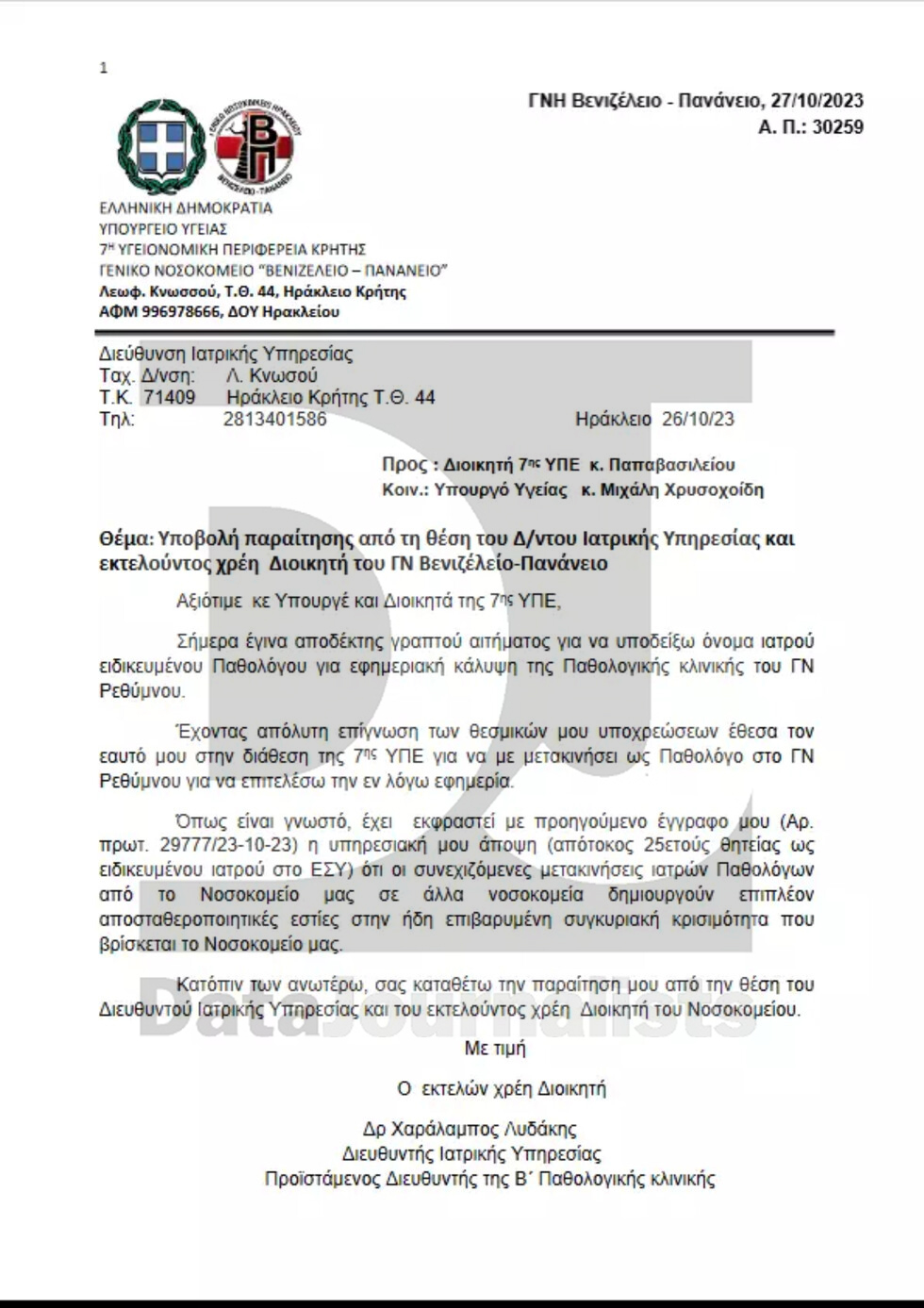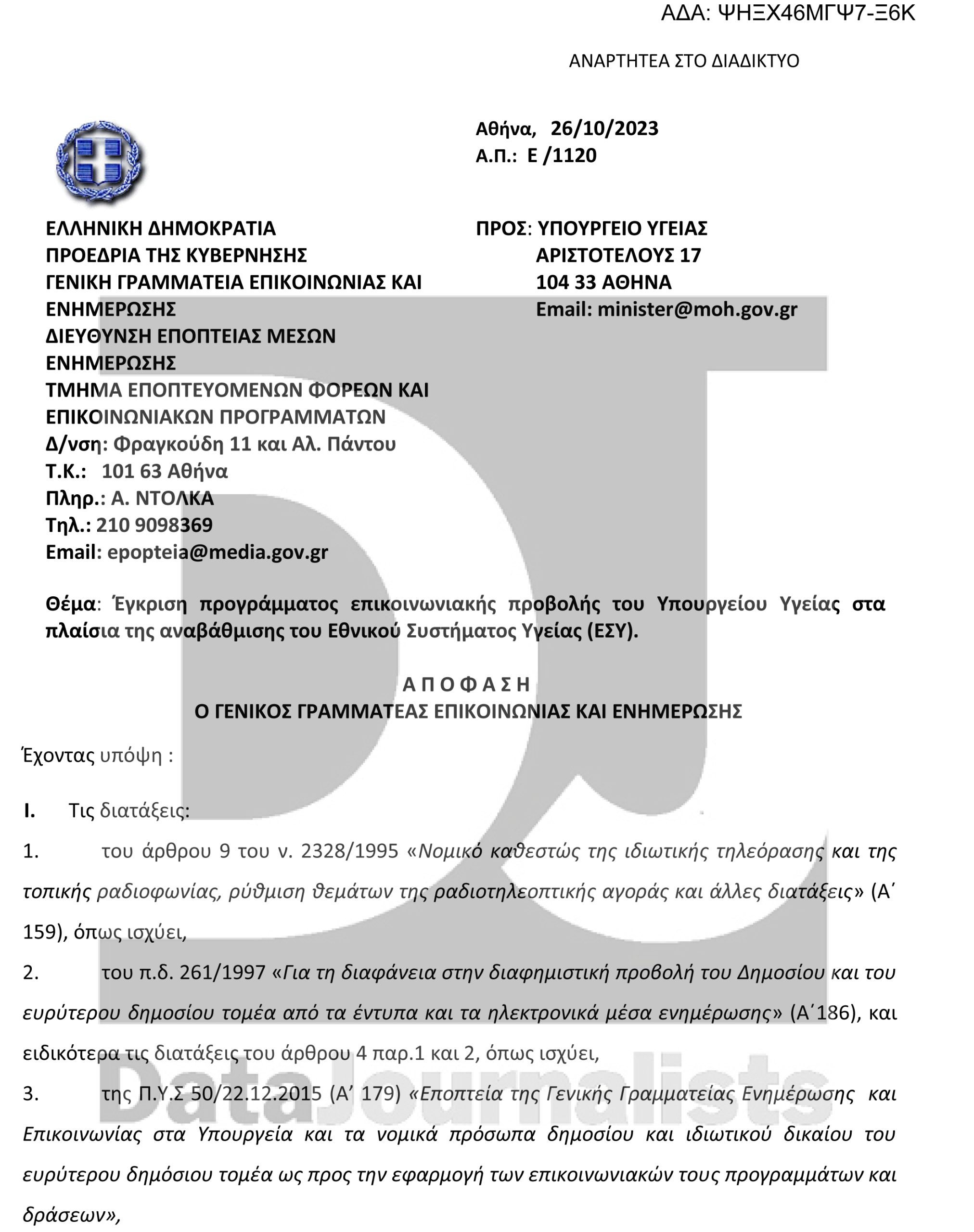- Meanwhile, 23 out of the 25 hospitals in Attica are on the verge of collapse, as serious problems arise with closed operating rooms and critical shortages in medical staff, and pharmacies lack essential drugs.
- Only 678 out of the 950 authorized positions for anesthesiologists are currently filled.
- Doctors in public hospitals in Thessaly express their concern after the serious issues resulting from the devastating floods, while at “Agios Dimitrios” in Thessaloniki, a doctor was injured when part of the hospital’s ceiling collapsed.
By Vasilis Galoupis
In 23 out of the 25 public hospitals (NHS) in Attica, serious issues are observed, with closed operating rooms and critical shortages in medical staff. Currently, only 678 out of the 950 authorized positions for anesthesiologists are filled in the National Health System. Meanwhile, managers, such as those in Venizelio Hospital, resign a few days after taking office due to “the ongoing transfers of pathologist doctors from our hospital to other hospitals.” Doctors in Thessaly express their concern after the serious problems caused by the devastating floods. In “Agios Dimitrios” in Thessaloniki, a doctor was injured when part of the hospital’s ceiling collapsed.
In 23 out of the 25 public hospitals (NHS) in Attica, serious issues are observed, with closed operating rooms and critical shortages in medical staff. Currently, only 678 out of the 950 authorized positions for anesthesiologists are filled in the National Health System. Meanwhile, managers, such as those in Venizelio Hospital, resign a few days after taking office due to “the ongoing transfers of pathologist doctors from our hospital to other hospitals.” Doctors in Thessaly express their concern after the serious problems caused by the devastating floods. In “Agios Dimitrios” in Thessaloniki, a doctor was injured when part of the hospital’s ceiling collapsed.
These are just a few of the recent news reports highlighting the actual and perennially problematic state of the National Health System. However, the situation does not seem to deter the Greek government, which decided on October 26, 2023, to allocate 2.9 million euros for an advertising campaign from the Recovery Fund, reportedly aiming for the “communication promotion of the Ministry of Health in the context of upgrading the National Health System.”
The decision on the 2,9 million advertising budget of the NHS
Specifically, on October 26, 2023, a decision was posted on Diavgeia by the Presidency of the Government and the General Secretariat of Communication – Information. The subject of the decision was the “Approval of a communication promotion program of the Ministry of Health in the context of upgrading the National Health System.”
According to the decision, “We approve the Ministry of Health’s communication outreach program, as part of the upgrading of the National Health System (NHS), which will be funded by the Recovery and Resilience Fund. The Ministry of Health’s communication program amounts to a total of two million eight hundred and eighty-nine thousand two hundred euros (EUR 2,889,200).
To make the specific decision, as stated in the official document, a request was submitted by the Ministry of Health on October 16, 2023. In this request, the ministry sought “approval for the communication promotion program of three actions of the Ministry of Health, as well as all actions of the ministry that are closely related to these actions, within the framework of upgrading the National Health System, with a total amount of 2,889,200 euros.”
The government responded ten days later, deciding to have the decision signed by the General Secretary of Communication and Information, Dimitrios Galamatis, “by order of the deputy minister,” namely Ioannis Bratakos.
The relevant provisions included in the official document refer to the Prime Minister’s decision with number Y9/29-6-2023 “Delegation of powers to the Deputy Minister to the Prime Minister, Ioannis Bratakos,” and subsequently to the decision with number 40/22-2-2021 by the Deputy Minister to the Prime Minister “Transfer of signing authority “By order of the Deputy Minister” to the General Secretary of Communication and Information.
The provisions also make reference to “transparency in the advertising promotion of the Public Sector and the broader public domain through print and electronic media.”
A campaign in the mass media took place a few days after the 6.8 million on the channels
This decision on the Ministry of Health’s media advertising campaign comes on top of the 6.8 million euros allocated by the government on 24.10.2023, by decision of the Deputy Minister to the Prime Minister Ioannis Bratakos, to the seven private channels of nationwide coverage to cover the contributions of the stations to the Journalist’s Organization of Supplemental Insurance and Health Care (EDOEAP) for the whole of 2022, under the pretext of Russia’s invasion of Ukraine.
The amount of EUR 2.9 million, with absorption from the Recovery Fund, cannot be considered negligible. There is a footnote in the decision that “no expenditure is incurred in the state budget”, but the money from the Recovery Fund is equally important, especially when it concerns the substantial – and not … communicative – upgrading of a degraded NHS and the needs of citizens.
LETTER OF RESIGNATION

Gaps and closed operating rooms in the National Health System frequently occupy the headlines in the daily Greek press, and they will not be covered by untimely and futile advertising campaigns that, among other things, will once again contribute additional revenue to the mass media. Instead, every euro should be directed towards addressing the significant daily challenges in the National Health System.
As indicative examples from the news reports of the past few days:
The letter of resignation submitted to the Ministry of Health by Dr. Charalambos Lidakis on 27.10.2023, who was serving as the Manager at Venizelio Hospital, a few days after his appointment, noted that the reason for his decision was “the ongoing transfers of pathologist doctors from our hospital to other hospitals,” which create “additional destabilizing factors in the already burdened situational criticality of our hospital.
On November 4, a doctor was injured at the Agios Dimitrios General Hospital in Thessaloniki when part of the building’s roof collapsed.
Agonizing appeals from Thessaly
On November 6, at a press conference of the Association of NHS Doctors at the University General Hospital of Larissa, its president Georgia Papadamou stressed that “COVID-19 is no longer an excuse. In meetings we have had we have not yet received answers about what we are asking for. The only winners at the moment are the private groups…”.
George Lialios, a surgeon and member of the University General Hospital of Larissa operating room committee, noted that “the operating rooms have a huge problem. The number of anesthesiologist doctors and nursing staff is insufficient. We try every day to do our best, but we need help in terms of staff and logistics.”
The devastating floods in Thessaly have led to significant problems in the hospitals of the broader region. According to a relevant announcement from the Associations of NHS (National Health System) Doctors in Thessaly, “in all hospitals, already depleted and insufficient in staff, there is increased pressure with an influx of patients and hospitalizations,” while “regular surgeries in most hospitals have been halted for days, serving only urgent cases.”
Program approval (pdf)

272 anesthesiologist vacancies in the NHS
According to data released by the Hellenic Society of Anaesthesiology at the end of October, only 678 of the 950 anesthesiologist positions are currently filled in the NHS. The vacancy corresponds to 28.63% of the organic posts, with the biggest problems being found on the islands and in Northern Greece.
The situation in the 25 hospitals in Attica according to POEDIN
On November 1st, the Panhellenic Federation of Public Hospital Employees (POEDIN) presented the results of its investigation on the 25 hospitals in Attica through an official statement. According to the research, the situation in each public hospital is as follows:
- EVANGELISMOS: 14 operating rooms are in operation out of 17. Marginal coverage of anesthesiologists, paramedics, and nursing staff.
- ATTIKON: There are 14 operating rooms, and 7 are in operation due to a lack of nursing staff.
- ERYTHROS STAVROS: The main issue of the hospital is the shortage of nursing staff. For this reason, out of the 9 surgical tables, 7 are in operation.
- THRIASIO: Out of the 13 operating rooms, 6 are in operation due to a shortage of anesthesiologists, nurses, and paramedics.
- ASKLIPIEIO VOULAS: Out of the 11 operating rooms, only 7 are open mainly due to a shortage of nursing staff. The building is being renovated through donations.
- PAMMAKARISTOS: There are 3 operating rooms, but only ophthalmologic cases are treated because there are no anesthesiologists. One of the two anesthesiologists has resigned. The surgical clinic has not been on call since June 2021.
- CHILDREN’S HOSPITAL “AGIA SOFIA”: It has 7 developed operating rooms, and 3 are in operation due to a shortage of nursing staff.
- CHILDREN’S HOSPITAL “AG. KYRIAKOU”: Since September, there has been a request to hire medical and nursing staff because there is a long wait for surgeries. There are 8 surgical tables, but only 3 are in operation.”
- AGIA OLGA: Out of the 7 operating rooms, 5 are in operation due to a shortage of nursing staff.
- ARETAIEIO: There are 5 operating rooms, and 3 are in operation due to a shortage of nursing staff.
- TZANEIO: There are 13 operating rooms. 7 are in operation due to a shortage of nursing staff and anesthesiologists.
- METAXA: There are 6 operating rooms, and 4 are in operation due to a shortage of mainly nursing staff and anesthesiologists.
- NIKAIA: The operating rooms are functional, but there are shortages in nursing staff.
- PAIDON PENTELIS: The hospital has 3 operating rooms, of which 2 are in operation due to a shortage of anesthesiologists and nursing staff.
- ELENA VENIZELOU: The hospital has 5 operating rooms, all of which are in operation. When there are long on-call services, 4 rooms are operational, leaving the 5th for emergencies. There is a shortage of anesthesiologists, surgeons, and nursing staff due to relocations and retirements. 40% of the staff is supplementary.
- SISMANOGLIO: The hospital operates 3 out of the 5 operating rooms due to a shortage of anesthesiologists, nursing, and paramedical staff. One of the 6 anesthesiologists at the hospital has been transferred to Pammakaristos Hospital.
- SOTIRIA: There are 5 operating rooms. 4 are in operation, and one is closed due to a shortage of nursing staff and all specialties.
- G. GENNIMATAS: There are 20 operating rooms that are functional, but there is a serious shortage of nursing staff, and they operate under-staffed.
- NIMTS: There are 4 operating rooms, and all are in operation. There are no shortages.
- AGIOS SAVVAS: There are 10 operating rooms, all functioning normally. Two anesthesiologists are retiring, and replacements are awaited.
- LAIKO: The hospital’s only issue is the nursing staff. The operating rooms function normally, but there are waiting lists.
- IPPOKRATEIO ATHENS: All operating rooms are functioning normally. There are no shortages in medical and nursing staff. The building is new, and there are no issues.
- ALEXANDRA: The operating rooms are functioning normally, but there are significant shortages in nursing, medical staff, and technologists.
- GENERAL ONCOLOGICAL HOSPITAL OF KIFISIA: There are 6 operating rooms, and they are operating normally. There are shortages in staff in general.
- ANDREAS SYNGROS: There is 1 operating room that is in operation. There is a severe shortage of personnel.
In conclusion, out of the 25 public hospitals in Attica, more than half are facing serious to very serious problems in the operation of their operating rooms, and almost all of them experience shortages of medical, nursing, and other specialized staff. According to POEDIN (Pan-Hellenic Federation of Public Hospital Employees), there are only two hospitals in the whole of Attica, the Ippokrateio and NIMTS, that do not face issues of dysfunction. Similar problems are encountered throughout the country.
All recent events show that the NHS does indeed need this EUR 2.9 million, but not for an advertising campaign…











Discussion about this post